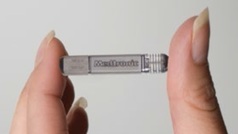 Many patients seek advice from a cardiologist because of palpitations. Sometimes the cause can be worked out from the clinical history and description of the symptoms with a reasonable degree of certainty (e.g. ectopic beats) but often it is necessary to try and correlate the patients symptoms with an ECG recorded at the same time. Classically this involved fitting the patient with a Holter monitor. These portable devices, named after Norman Holter, American biophysicist, continuously monitoring the electrical activity of the heart. Originally recording onto cassette tape they now use digital technology which has reduced their size. The 24h tape is a useful investigation provided that symptoms occur frequently. However in my experience most patients with palpitations do not have daily symptoms and therefore the value of a short period of recording is low. The other growing use of these devices is to detect asymptomatic arrhythmias such as atrial fibrillation (AF) which is a very common cause of stroke. Detection of episodes of this arrhythmia and offering anticoagulation can dramatically reduce the risk of recurrent stroke. Again a 24h period of recording has limited utility to detect episodes of AF which may occur infrequently. Of course it is possible to record cardiac rhythm for upto 7 days using these monitors or single lead cardiac event recorders such as the Novacor device however these become uncomfortable when worn for long periods of time due to the adhesive electrodes causing skin irritation. Also the electrodes often displace or contact is lost limiting the quality of the recording. An alternative would be an implantable device to record the ECG. Such a device has existed in the form of the implantable loop recorder also known as a Reveal since 1998. Over the last 14 years the device, which is about the size of a USB stick, has become more sophisticated in terms of algorithms for the detection and assessment of arrhythmia although the size remained the same. However all that is about to change because In the last few days Medtronic have launched the new Reveal LINQ device. 90% smaller than the old one and more sophisticated it occupies a volume of one cubic centimetre and can be inserted through a tiny nick in the skin in with a special applicator. The whole process takes but a moment and yet once in place the device can record the ECG continuously for 3 years and the data can be downloaded to a computer wirelessly and transmitted to the physician for interpretation. The easy insertion, small size and long battery life put this device centre stage for the management of patients with arrhythmia. If you have paroxysmal AF then using this device to monitor frequency of occurrence and adjust treatment would be very helpful for the doctor and patient since we know that symptoms are not a good guide to the frequency of arrhythmias. With the advent of Smartphone technology it won't be long before we see implantable devices able to monitor all aspect of a patients physiology and communicate it to doctor and patient. Reveal LINQ
1 Comment
Colin Movsowitz
22/2/2014 10:14:22 am
The value of the Linq will be determined by the quality of the electrograms
Reply
Your comment will be posted after it is approved.
Leave a Reply. |
Dr Richard BogleThe opinions expressed in this blog are strictly those of the author and should not be construed as the opinion or policy of my employers nor recommendations for your care or anyone else's. Always seek professional guidance instead. Archives
August 2023
Categories
All
|
 RSS Feed
RSS Feed

